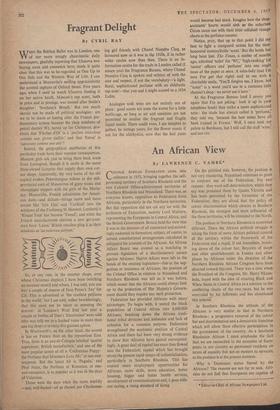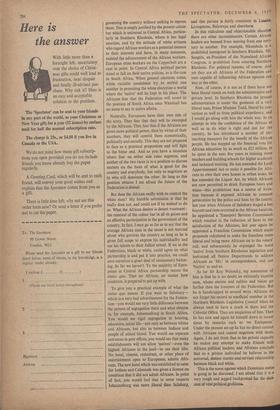An African View
By LAWRENCE C. VAMBE* safeguard the interests of the Africans. An African Affairs Board was created as a watchdog to prevent legislation of a discriminatory nature against Africans; Native Affairs were left in the hands of the existing legislature—this' at the sug- gestion or insistence of Africans; the position of the Colonal Office in relation to Nyasaland and Northern Rhodesia was left as it was before, which meant that the Africans could always look up to the protection of Her Majesty's Govern- ment should they require any such protection.
Federation has provided Africans with many advantages. To begin with, it united the black population of Central Africa into 6,000,000 Africans, breaking down the African tradi- tional tribal divisions and jealousies and lack of cohesion for a common purpose. Federation strengthened the economic position of Central Africa and there has been very strong evidence to show that Africans have gained correspond- ingly. A great deal of capital has since then flowed into the Federation, capital which has brought about the present rapid tempo of industrialisation, particularly in Southern Rhodesia. This has created more employment opportunities for Africans, more skills, more education, better housing, bigger and better health services, development of communications and, it goes with- out saying, a rising standard of living.
On the political side, however, the position is not very reassuring. Nyasaland continues to press to contract out of the Federation. For two reasons : they want self-determination, which they say was promised them by Queen Victoria and has been prevented by the formation of the Federation; they are afraid that the policy of colour discrimination which obtains in Southern Rhodesia, the strongest and most influential of the three territories, will be extended to the North.
The position in Northern Rhodesia is somewhat different. There the African political struggle is taking the form of more African political control of the territory within the framework of the Federation and a rapid, if not immediate, break- ing down of the colour bar. Boycotts of shops and other establishments in Lusaka and other places by Africans under the direction of the Northern Rhodesia African Congress have been directed toward this end. There was a time when the President of the Congress, Mr. Harry Nkum- bula, toyed with the idea of creating Black and White States in Central Africa as a solution to the conflicting claims of the two races, but he was overruled, by his followers and has abandoned this scheme'.
In Southern Rhodesia the attitude of the Africans is very similar to that in Northern Rhodesia : a progressive removal of the colour bar and discrimination and a democratic franchise which will allow them effective participation in the government of the country. As a Southern Rhodesian African I must emphasise the fact that we are reconciled to the existence of Euro- peans in our country as permanent residents on terms of equality but not as masters to servants, as the position is at the present moment.
Why is Dominion status feared by the Africans? The reasons are not far to seek. Afri- cans do not feel that Europeans are capable of • Editor-in-Chief of African Newspapers Ltd. governing the country without seeking to repress them. This is amply justified by the present colour bar which is universal in Central Africa, particu- larly in Southern Rhodesia, where it has legal sanction, and by the attitude of white artisans who regard African workers as a potential menace to their interests and have, in many instances, resisted the advancement of the African workers. European mine workers on the Copperbelt are a case in point. In Central Africa political parties stand or fall on their native policies, as is the case in South Africa. When general elections come, white racialist candidates try to outbid one another in promising the white electorate a world where the 'native' will be kept in his place. The Africans fear that the Federation will revert to the position of South Africa once Whitehall has no more to say in native affairs.
Naturally, Europeans have their own side of the story. They fear that they will be swamped by the Africans. They fear that if the Africans are given more political power, then by virtue of their numbers, they will control them economically, politically and socially. This they are not prepared to face as a practical proposition and will fight to the bitter end. And so you have a situation where fear on either side rules supreme, and neither of the two races is in a position to discuss matters on the basis of what is good for the country and everybody, but only to negotiate as to who will dominate the other. So long as this position obtains I am afraid the future of the Federation is dismal.
But does the African really wish to control the white man? My humble submission is that he really does not, and could not if he wished to do so. What the African desires is decent treatment : the removal of the colour bar in all its guises and an effective participation in the government of the country. In fact, I may go so far as to say that the average African man in the street is not worried about who governs the country so long as he is given full scope to express his individuality and use his talents to their fullest extent. If we in the Federation, black or white, could agree on what partnership is and put it into practice, we could save ourselves a great deal of unnecessary bicker- ing. So far we haven't. To the majority of Euro- peans in Central Africa partnership means the status quo. That no African, no matter how moderate, is prepared to put up with.
To give you a practical example of what the status quo means. if you went to Salisbury— which is a very bad advertisement for the Federa- tion—you would see very little difference between the pattern of segregation there and what obtains in, for example, Johannesburg in South Africa. You would see rigid segregation in housing, education, social life—not only as between whites and Africans, but also as between Indians and people of mixed blood. You would see separate entrances in post offices, you would see that many establishments will not allow `natives'—even the highest Africans in the land—to use their lifts. No hotel, cinema, restaurant, or other place of entertainment open to Europeans, admits Afri- cans. The new hotel which was established to cater for Indians and Coloureds was given a licence on condition that it did not admit Africans. In point of fact, you would feel that in some respects Johannesburg was more liberal than Salisbury, and this picture is fairly consistent in Lusaka, Livingstone, Bulawayo and elsewhere.
In this ridiculous and objectionable situation there are other inconsistencies. Certain African
leaders are banned from moving from one terri- tory to another. For example, Nkumbula is a prohibited immigrant in Southern Rhodesia. Mr. Sangala, ex-President of .the Nyasaland African Congress, is prohibited from entering Northern Rhodesia. For political reasons, of course. And yet they are all Africans of the Federation and men capable of influencing African opinion one way or the other.
Now, of course, it is not as if there have not been liberal trends on both the administrative and private level. In Southern Rhodesia the present administration is under the guidance of a very liberal man, Prime Minister Todd, liberal by con- viction as well as from political expediency, and I would go along with him the whole way. In an attempt to win the confidence of the African as well as to do what is right and just for the country, he has introduced a number of far- reaching measures for the benefit of the African people. He has stepped up the financial vote for African education by as much as £12 million, to be spent in the next five years in training more teachers and building schools for higher academic and technical training. He has amended the Land Apportionment Act to make it possible for Afri- cans to own their own homes in urban areas; he has amended the Liquor Act, by which Africans are now permitted to drink European beers and wines—this prohibition was a source of irrita- tion because it exposed Africans to constant persecution by the police and fines by the courts; last year when Africans of Salisbury staged a bus boycott and riots occurred in the African location, he appointed a Transport Services Commission which resulted in the reduction of fares to the satisfaction of the Africans; last year again he appointed a Franchise Commission which made proposals calculated to make the franchise more liberal and bring more Africans on to the voters' roll, and subsequently he expunged the word 'native' from Southern Rhodesian legislation and instructed all Native Departments to address Africans as 'Mr.' in correspondence, and not `Native' so and so.
As for Sir Roy Welensky, my assessment of him is that he is no doubt an extremely capable man, whose stature and calibre and vision go farther than the frontiers of the Federation. But he is handicapped in several ways. Africans do not forget his record as unofficial member in the Northern Rhodesia Legislative Council when he always used to have a crack at them and the Colonial Office. They are suspicious of him. Then he has now and again let himself down in recent times by remarks such as 'we Europeans.' Under the present set-up he has no direct contact with Africans and cannot negotiate with them. Again, I do not think that in his private capacity he makes any attempt to make friends with African political leaders; and Africans conclude that as a private individual he believes in the universal, distant master-and-servant relationship between black and white.
This is the scene against which Dominion status is going to be discussed. I am afraid that it is a very rough and jagged background for the deci- sion of vital political problems.















































 Previous page
Previous page